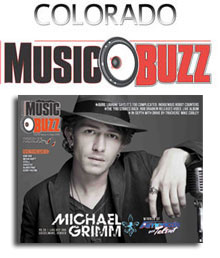The Manager’s Corner
by Chris Daniels
I’ve managed my own band for 30 years, I’m in the Colorado Music Hall of Fame and I’ve produced more than 20 albums – and this business is changing at digital speed and it takes working harder than ever to break through the noise. But success is still built on some basic tried and true elements: great music & performance, and really hard work and the luck of timing. The book I wrote for my class at CU Denver on artist management is called “DIY: You’re Not in it Alone.” That’s the new reality for artists. Whether on our local Colorado “island” or in the greater internetville … there are a lot of us out there doing everything we can to survive… and we learn as much as we can from our peers. Here is a little of what I heard of value at this year’s CU Denver Music Business Seminar.
Panelists included Jon Forman, lead singer and guitarist for Switchfoot, Kevin Lyman, founder of Vans Warped Tour, and the Mayhem tour and a partner at Side One Dummy Records, JJ Italiano, manager of acts like “I Fight Dragons” and The Flobots,” three of Colorado’s most experienced music lawyers, Steve Erwin, Amber McClain and Dave Ratner, plus a whole load of others too numerous and fantastic to name. Key points that came out of the seminar were:
1) Songwriting: if you are a writer – for god sakes understand your process and then do everything you can to foster that talent, craft and art. This was the message from EVERYBODY there … the song… your writing, whether it is EDM or Hip Hop track production & writing (Ms. McClain represents a number of those) or an alt pop-rock anthem – the song is your most valuable asset and you are the only one who can perfect that craft.
2) Revenue streams: understanding HOW you earn money is almost as important as making the music that you will market. It is not just creating music but also protecting it and exploiting its commercial potential. They are of equal importance. Protecting it includes basics like copyrighting your music and getting a State or Federal patent protection for your BRAND…things like the name of your band. Many panelists stressed the importance of a written agreement between band members and establishing yourself as a business …preferably an LLC as there are liability issues for performing artists. It also includes HOW you do business (trust me, the music industry is a small place and if somebody is a jerk – or much worse- that information gets around very fast.) These things are part and parcel of protecting the brand you create.
3) Exploiting your music, your live show and everything that contributes to what we loosely call your ‘brand’ is the key for the post-major-label reality of our time. In no particular order here is a short list of the revenue streams you should be familiar with and exploiting. (a) performing live: you need to be able to captivate an audience whether it is DJ work at a local venue or metal night at Herman’s…you’ve got to be able to “bring it” or to “kill” as the comics say. (b) exploiting USE of your song through publishing placements with TV, commercials, and especially films. Denver/Boulder/Ft Collins is home to some of the most innovative independent film producers and YOU may have the song or track they need. This also means you UNDERSTAND what publishing is – and how it differs from the ownership of the recording you make (or others make) of that song. (c) your recordings – basement studio or professional studio – SoundCloud, DIY putting it out yourself, or signed to an independent label. The recorded “master” of a song or track is as valuable a property to be exploited as the song itself, and they are different revenue streams. All three of these are your “intellectual property” and they contribute to making a living as a music person (artist) – but they are not the only parts of your brand you need to develop, exploit and protect. (d) merch is an essential part of this river of pennies and dollars that contribute to your survival – especially on the road (more in a moment). (e) sponsorships and endorsements from companies that support music. This can range from instrument endorsements to finding sponsorships for an album or tour plus a good sponsorship relationship may last for years. (f) finally there is the new area of crowd funding for developing these revenue streams and the social networking that is necessary to (i) connect with your fans and (ii) become comfortable talking with fans about what you are doing – how you are developing your art.
Finally, I want to share a little special sauce from one of the most remarkable people in music today, Kevin Lyman. As stated, he is founder of The Warped Tour but he’s much, much more. I see Kevin as the founder of a business system that is the key to success in the post major label world. Put simply, Lyman believes in working with artists, sponsors, and independent labels to create very successful partnerships. In the past artists fought for a major deal. Those majors overpaid artists up front and expected to lose money on eight out of every nine artists they signed – praying that some “Adele” would save their ass. Lyman practices a new philosophy. Working with his own and other independent companies he looks at a world where reasonable advances help an artist develop a savvy business approach where sales of a first release of between 3,000 and 5,000 paid downloads or CDs. Those meager sales numbers used to get the artist dropped by a major. But for independents it earns the artist a royalty AND a second album to continue to develop their art. Artists who play the Warped Tour for the first time are making between $300 and $600 per show. (Headline acts get between $12,000 and $16,000 per show) They do 43 cities in 56 days and the artists make real money on their merch AND they eat better than they do at home. He doesn’t believe in dressing rooms but instead a common area where artists, sponsors and promoters get together and talk about what’s going on and how they are developing their craft. HE WILL NOT DO BUY-ONs (meaning artists cannot pay to be on the Warped Tour). He hates that all-too-common practice in the industry. If you are lucky enough to get on the Warped Tour – the first thing that will happen is he and his team work directly with you and their sponsors so you develop a direct relationship with the companies that make his tour possible. This is only part of a set of business practices that include strong involvement with a number of charities, extensive efforts to make his tour more sustainable every year and to give music fans an incredible day of music at an affordable price in every city they hit. There is much more to tell but let me leave you with a set of amazing numbers and one final tip of the hat. The Warped Tour sold more than 120,000 tickets for 2014 before the bands were announced. It costs roughly a million dollars a week to keep about 50 busses and trucks on the road and they have never made money through ticket sales (except for one year). They work extensively for and with their sponsors to make the tour possible. Almost 1,000 people work the Warped Tour each day, including volunteers, and it is a collective attitude with strong rules on how success is achieved – hard work, great music, and love for the fans that come to enjoy the bands. The daily lineup changes in every city so come for the day, drink lots of water and take care of yourself, this is marathon fun. And the tip of the hat – Lyman and his staff are ALWAYS looking for the best new music – whether it’s a band that they saw in a club while traveling or a SoundCloud link that came from a friend… they are relentless. BUT YOU HAVE TO HAVE YOUR SHIT TOGETHER. All that stuff that I started this article talking about … that is a given … they EXPECT you to have all that together. Touring all over they US and Canada is not for artists who are just starting. Thanks to Colfax Root 40 Music Festival, CU Denver Music Business Seminar and all the panelists for “bringing it” – to Colorado!
Category: Shop Talk






